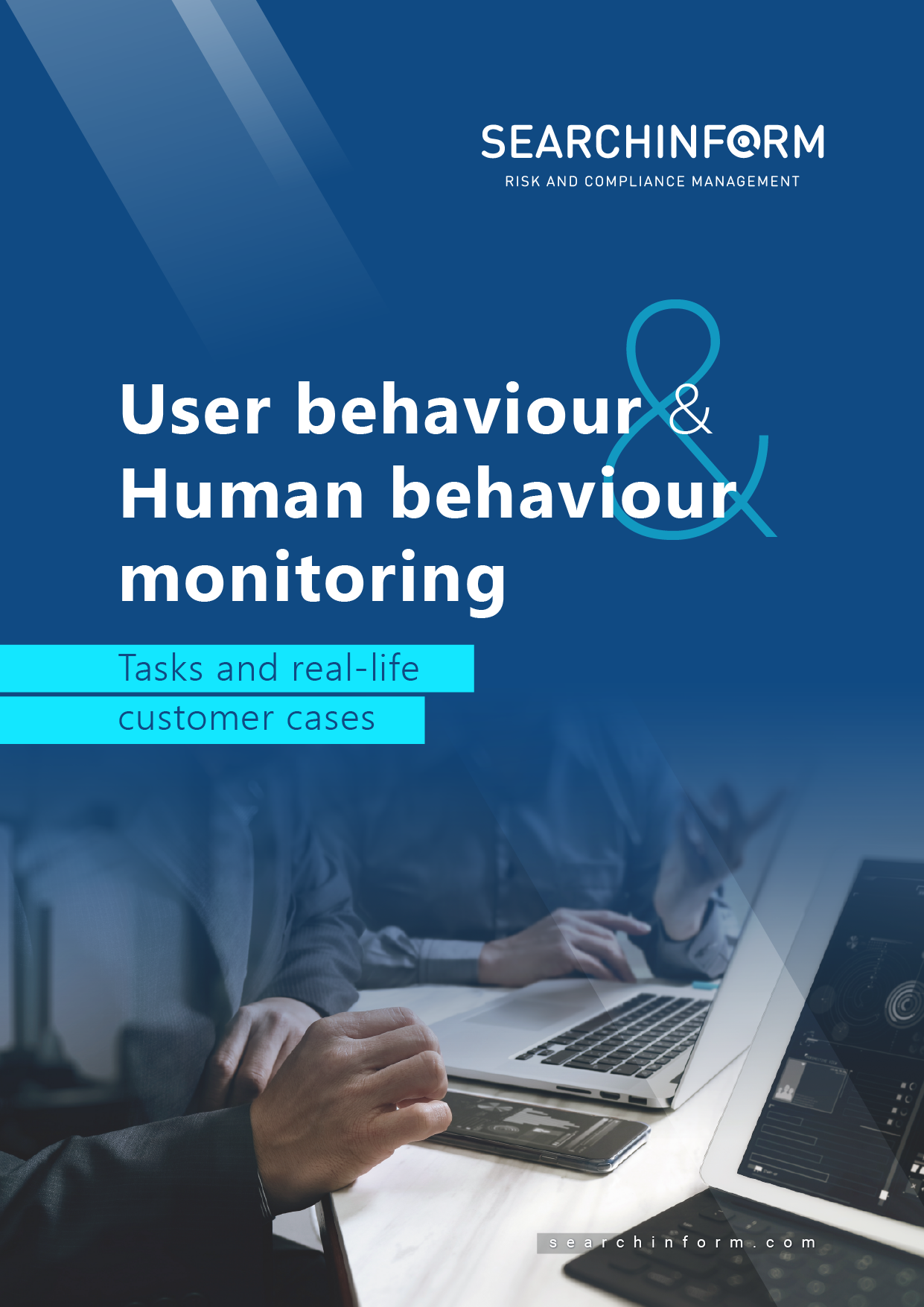Unraveling FERPA Violations: A Comprehensive Guide
- Overview of the Family Educational Rights and Privacy Act
- What Constitutes a FERPA Violation?
- Unauthorized Disclosure
- Insufficient Data Security Measures
- Improper Handling of Requests for Access or Amendment
- Inadequate Training and Oversight
- Implications of FERPA violations
- Loss of Funding
- Legal Penalties
- Damage to Reputation
- Loss of Trust
- Consequences and Legal Ramifications
- How SearchInform Can Help?
Overview of the Family Educational Rights and Privacy Act
At its core, FERPA grants certain rights to eligible students and their parents regarding access to and control over student education records. These rights include:
- Right to Access: Eligible students and their parents have the right to access the student's education records maintained by the educational institution. This includes transcripts, grades, attendance records, and any other personally identifiable information.
- Right to Amend: If a student or their parent believes that information in the education records is inaccurate, misleading, or in violation of their privacy rights, they have the right to request that the records be amended.
- Right to Consent: Educational institutions must obtain written consent from the eligible student or their parents before disclosing personally identifiable information from education records, except in certain specified circumstances outlined in the law.
- Right to Privacy: FERPA protects the privacy of student education records by prohibiting the disclosure of personally identifiable information without the student's consent, with some exceptions. These exceptions include disclosures to school officials with legitimate educational interests, other schools to which a student is transferring, and certain government entities.
The importance of student data privacy cannot be overstated. Educational records contain sensitive information that, if mishandled, could lead to significant privacy breaches, identity theft, or other forms of harm. By safeguarding this information through FERPA compliance, educational institutions help protect the rights and well-being of their students and their families.
Furthermore, ensuring compliance with FERPA not only protects individual privacy but also fosters trust between educational institutions and their stakeholders. Students and parents are more likely to feel confident in sharing information with schools when they know that their privacy is respected and protected under the law.
What Constitutes a FERPA Violation?
A FERPA violation occurs when an educational institution fails to comply with the requirements and protections outlined in the Family Educational Rights and Privacy Act (FERPA). These violations can take various forms, but they generally involve the unauthorized disclosure or mishandling of personally identifiable information from student education records. Here are some common examples of FERPA violations:
Unauthorized Disclosure
It's crucial for educational institutions to uphold the confidentiality of student education records under FERPA. Unauthorized disclosure occurs when sensitive information, like grades, disciplinary records, or medical details, is shared with third parties without the express written consent of the student or their parents. Whether it's inadvertently sharing information with unauthorized individuals or organizations or purposefully disclosing it without proper authorization, any such action violates FERPA's strict guidelines. This means educational institutions must be diligent in ensuring that information is only shared with those who have a legitimate need to access it and have obtained the necessary consent.
Insufficient Data Security Measures
FERPA places a significant emphasis on protecting student education records through robust data security measures. Educational institutions are obligated to implement adequate safeguards, such as encryption, access controls, and secure storage practices, to prevent unauthorized access or data breaches. Failure to do so can leave sensitive information vulnerable to exploitation or misuse, putting students' privacy at risk. Whether it's negligence in securing digital databases or lax physical security measures for paper records, any oversight in maintaining data security can result in FERPA violations and the potential compromise of student information.
Improper Handling of Requests for Access or Amendment
Part of FERPA compliance involves promptly and appropriately responding to requests from eligible students or their parents regarding access to or amendment of education records. Educational institutions must ensure that proper procedures are followed, and requests are addressed without unnecessary delays or denials. Failing to adhere to these guidelines, whether due to administrative oversight or intentional obstruction, constitutes a violation of FERPA. Students and their parents have a right to access and correct inaccuracies in their education records, and educational institutions must respect and facilitate this process in accordance with the law.
Inadequate Training and Oversight
Maintaining FERPA compliance requires ongoing training and oversight to ensure that all faculty, staff, and personnel involved in handling student education records understand their responsibilities and obligations. Educational institutions must provide comprehensive training programs that cover FERPA regulations, data privacy protocols, and proper handling procedures for student information. Additionally, effective oversight mechanisms must be in place to monitor compliance and address any potential issues or discrepancies proactively. Failure to provide adequate training or oversight can lead to inadvertent violations of FERPA, as personnel may unknowingly mishandle student information or neglect important privacy considerations. Therefore, investing in continuous education and oversight is essential to upholding FERPA standards and safeguarding student data privacy.
Implications of FERPA violations
Implications of Family Educational Rights and Privacy Act violations can vary depending on the severity and extent of the violation, but they can have significant consequences for educational institutions, including:
Loss of Funding
Violating FERPA can have severe financial consequences for educational institutions. The U.S. Department of Education has the authority to withhold federal funding from institutions found to be in violation of FERPA regulations. This loss of funding can significantly impact an institution's ability to operate effectively, affecting its capacity to provide quality education, support programs, and infrastructure. Without access to vital federal funds, educational institutions may struggle to maintain essential services and resources, leading to potential disruptions in the learning environment and overall institutional functioning.
Legal Penalties
FERPA violations can also result in legal repercussions for educational institutions. Institutions found to have violated FERPA may face legal penalties, such as fines or lawsuits, imposed by regulatory authorities or affected individuals. Additionally, individuals directly responsible for the violations, such as school administrators or employees, could face disciplinary action or personal liability for their actions. Legal battles and associated costs can drain institutional resources and divert attention away from core educational missions, further exacerbating the impact of FERPA violations on the institution's overall well-being and stability.
Damage to Reputation
Beyond financial and legal consequences, FERPA violations can inflict lasting damage to an educational institution's reputation. Breaching student privacy rights undermines trust and confidence among students, parents, and the broader community. Negative publicity surrounding FERPA violations can tarnish the institution's image, leading to decreased enrollment numbers, alumni disengagement, and strained relationships with community stakeholders. The erosion of trust can have long-term repercussions, affecting the institution's credibility, prestige, and competitive position within the educational landscape.

Loss of Trust
Perhaps the most significant consequence of FERPA violations is the loss of trust between the educational institution and its stakeholders. Students, parents, alumni, and community members place their trust in educational institutions to safeguard sensitive information and uphold ethical standards. FERPA violations betray this trust and can cause profound disillusionment among stakeholders. Rebuilding trust once it's been compromised is a daunting task that requires sustained efforts towards transparency, accountability, and institutional reform. It may take years of concerted action to repair relationships and regain the confidence of those affected by the breach of student privacy rights. Without trust, educational institutions risk alienating stakeholders and undermining their support, ultimately hindering their ability to fulfill their educational mission and serve their communities effectively.
Understanding and adhering to FERPA regulations is essential for educational institutions to protect the privacy rights of students and avoid the serious consequences associated with FERPA violations.
Consequences and Legal Ramifications
Consequences and Legal Ramifications of FERPA Violations can be severe and multifaceted, ranging from financial penalties to reputational damage and legal action.
Penalties for FERPA violations may include fines imposed by the U.S. Department of Education or other regulatory bodies. These fines can vary in severity depending on the nature and extent of the violation, potentially amounting to significant financial burdens for the institution. Additionally, educational institutions found to be in violation of FERPA may face lawsuits filed by affected individuals or advocacy groups seeking damages for privacy breaches. Legal action can result in court-ordered remedies, settlements, or judgments against the institution, further exacerbating the financial implications of FERPA violations.
Legal cases and precedents serve as important reference points in understanding the potential consequences of FERPA violations. Past cases have demonstrated that courts take student privacy rights seriously and may award substantial damages to plaintiffs in FERPA-related lawsuits. These cases establish legal precedents that shape interpretations of FERPA and inform future enforcement actions and litigation strategies. Educational institutions must be aware of relevant legal rulings and precedents to mitigate the risk of facing similar legal challenges in the future.
Reputational damage to institutions is another significant consequence of FERPA violations. Public disclosure of privacy breaches or regulatory enforcement actions can tarnish an institution's reputation and erode trust among students, parents, alumni, and the broader community. Negative media coverage, social media backlash, and public scrutiny can further amplify reputational harm, leading to decreased enrollment, donor disillusionment, and diminished institutional prestige. Rebuilding trust and repairing reputational damage requires proactive communication, transparency, and accountability measures to demonstrate a commitment to rectifying past mistakes and preventing future privacy breaches.
FERPA violations can have far-reaching consequences for educational institutions, encompassing financial penalties, legal liabilities, and reputational damage. To mitigate these risks, institutions must prioritize compliance with FERPA regulations, invest in robust data privacy measures, and foster a culture of accountability and transparency to uphold student privacy rights and safeguard institutional integrity.
Protecting Against FERPA Violations
Protecting against FERPA violations requires a comprehensive approach that encompasses robust data encryption and security measures, access controls and permissions, as well as monitoring and auditing practices.
Data encryption and security measures play a crucial role in safeguarding student education records from unauthorized access or breaches. Educational institutions should employ encryption technologies to encrypt data both in transit and at rest, ensuring that sensitive information remains protected even if intercepted by unauthorized parties. Additionally, implementing strong password policies, multi-factor authentication, and encryption protocols further enhances data security and prevents unauthorized access to student records.
Access controls and permissions are essential for limiting access to student education records only to authorized personnel with legitimate educational interests. Educational institutions should implement role-based access controls, granting users access privileges based on their specific job responsibilities and the principle of least privilege. By restricting access to a need-to-know basis, institutions can minimize the risk of unauthorized disclosure or misuse of student information. Regularly reviewing and updating access permissions ensures that access privileges remain aligned with staff roles and responsibilities over time.
Monitoring and auditing practices are critical for detecting and preventing potential FERPA violations proactively. Educational institutions should implement robust monitoring systems that track access to student education records in real-time, monitoring for any unauthorized or suspicious activities. Regular audits of access logs and user activities help identify potential security breaches or compliance issues, allowing institutions to take prompt corrective action. Additionally, conducting periodic security assessments and penetration testing can uncover vulnerabilities in systems or processes, enabling institutions to address them before they are exploited by malicious actors.
In conclusion, protecting against FERPA violations requires a multi-layered approach that integrates data encryption and security measures, access controls and permissions, and monitoring and auditing practices. By implementing these measures effectively, educational institutions can uphold student privacy rights, mitigate the risk of data breaches, and maintain compliance with FERPA regulations.
How SearchInform Can Help?
SearchInform Solutions offers a range of features and functionalities that can help educational institutions avoid FERPA penalties by enhancing data security, access control, and compliance monitoring. Here are some of the benefits:
Data Encryption and Security: SearchInform Solutions provide robust encryption and security features to safeguard sensitive student information from unauthorized access or leakages. By encrypting data both in transit and at rest, educational institutions can ensure that student records remain protected against interception or unauthorized disclosure, thereby reducing the risk of FERPA violations.
Access Controls and Permissions: SearchInform Solutions enable educational institutions to implement granular access controls and permissions, allowing them to restrict access to student records based on users' roles and responsibilities. By enforcing the principle of least privilege, institutions can minimize the risk of unauthorized disclosure or misuse of student information, thereby enhancing compliance with FERPA regulations.
Monitoring and Auditing: SearchInform Solutions offer robust monitoring and auditing capabilities, allowing educational institutions to track access to student records in real-time and monitor for any unauthorized or suspicious activities. By analyzing access logs and user activities, institutions can detect potential security breaches or compliance issues early on, enabling them to take prompt corrective action and prevent FERPA violations.
Compliance Reporting: SearchInform Solutions provide comprehensive reporting functionalities that enable educational institutions to demonstrate compliance with FERPA regulations. By generating detailed compliance reports and audit trails, institutions can provide evidence of their efforts to protect student privacy rights and mitigate the risk of FERPA penalties.
Risk Assessment and Mitigation: SearchInform Solutions offer risk assessment and mitigation capabilities, allowing educational institutions to identify and address potential vulnerabilities in their systems and processes. By conducting regular security assessments and penetration testing, institutions can proactively identify and mitigate risks to student data security, thereby reducing the likelihood of FERPA violations.
Full-featured software with no restrictions
on users or functionality
Company news
SearchInform uses four types of cookies as described below. You can decide which categories of cookies you wish to accept to improve your experience on our website. To learn more about the cookies we use on our site, please read our Cookie Policy.
Necessary Cookies
Always active. These cookies are essential to our website working effectively.
Cookies does not collect personal information. You can disable the cookie files
record
on the Internet Settings tab in your browser.
Functional Cookies
These cookies allow SearchInform to provide enhanced functionality and personalization, such as remembering the language you choose to interact with the website.
Performance Cookies
These cookies enable SearchInform to understand what information is the most valuable to you, so we can improve our services and website.
Third-party Cookies
These cookies are created by other resources to allow our website to embed content from other websites, for example, images, ads, and text.
Please enable Functional Cookies
You have disabled the Functional Cookies.
To complete the form and get in touch with us, you need to enable Functional Cookies.
Otherwise the form cannot be sent to us.

Subscribe to our newsletter and receive a bright and useful tutorial Explaining Information Security in 4 steps!

Subscribe to our newsletter and receive case studies in comics!







